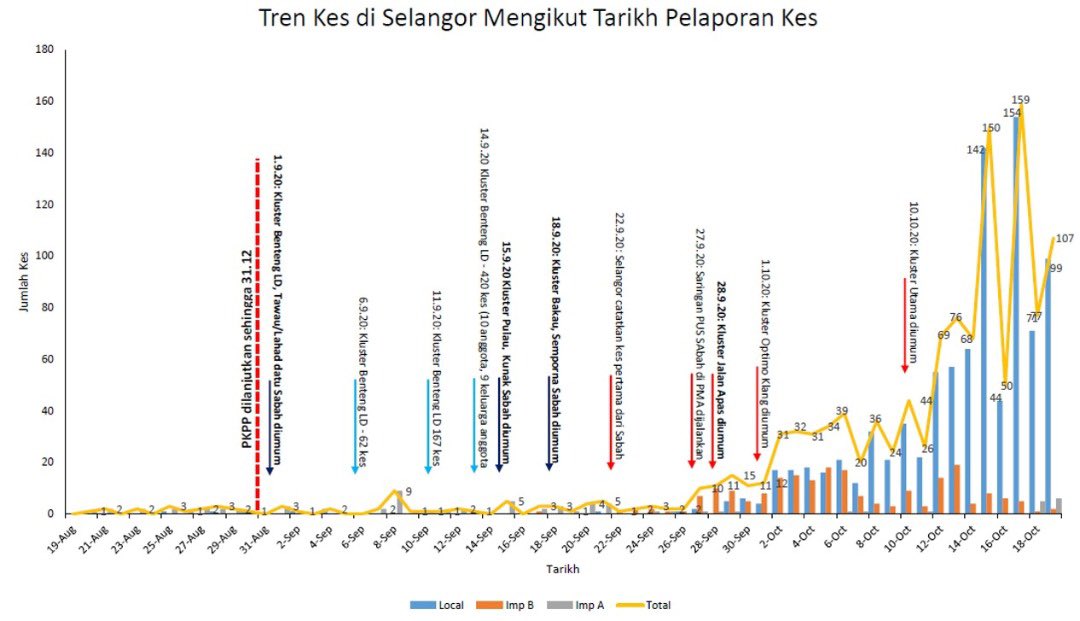KUALA LUMPUR, Oct 20 — A Covid-19 cluster that was first discovered at a shopping centre in Selangor have led to six generations of spread of the coronavirus, according to the Ministry of Health (MOH).
Six generations of spread means a person who infects another, who then infects another, who infects yet another, who then infects another person, who then infects someone else.
“We looked into the mall for example, the infection may have started in the mall and we have identified a few of the workers in the mall tested positive. So what we did is to close down the mall for one week and we discussed with the management of the mall,” Dr Noor Hisham told a press conference.
“So what we did was a clean-up and screening for all workers. So we have done that. Sanitisation, disinfection all have been done. Rest assured, the mall has already been cleared.”
It is to be noted that the index case (Patient 5,023) of the Utama cluster — which was first discovered in a shopping centre in Selangor — was a 28-year-old Nepalese security guard of that mall who positively tested for the virus on October 8. The Utama cluster recorded nine new Covid-19 cases today, leading to a total of 194 infections so far in the cluster.
Another staff from a cafe at the shopping centre has also tested positive on October 18. Some prominent malls in Selangor have contributed to positive cases in the state’s third wave of Covid-19.
“But when you get an infection in the mall, then you return to the home. Then you start to infect your family, your friends and etc. So now the infection has actually involved six generations. Those who are infected in the mall may be the first generation. But those coming back home and infecting others, it’s already leading to six generations,” Dr Noor Hisham said.
“But the good thing about Selangor is 90 per cent of infections, we know the cluster. Through MySejahtera, we can trace them, whether in Selangor or out of Selangor.”
MOH also mentioned that 50 per cent of samples collected in Semporna, Sabah, have tested positive for the coronavirus
“When we look into Semporna, initially every 10 patients in swab tests, five are positive, If you see Bangau-Bangau and Lahad Datu clusters, we have increased the number of testing and screening for Semporna,” said Dr Noor Hisham.
“In Semporna, we are focusing into certain localities and certain clusters to increase our screening. The more we screen, I hope that we can identify and isolate them and then we reduce the cases in Semporna.”
According to a tweet by MOH, one-third of Covid-19 cases in Selangor had travel history to Sabah, while two-thirds of cases in the state were community transmission.
Population density and the high rate of population mobility in Selangor are the key reasons for the rise in the cases, MOH mentioned.
“Even before the areas labelled as red zones in Selangor, we already know that the R-naught in Selangor is about 1.9. So from 2.2 right down to 1.9, and now it is about less than 1.48, for example,” Dr Noor Hisham added.
The R-naught is the reproduction rate of coronavirus. An R-naught of 1.48 means one Covid-19 case on average leads to 1.48 new cases.
Dr Noor Hisham emphasised the importance of collaboration among the public in Klang Valley to contain the Covid-19 virus.
Of the 87 active clusters nationwide, 32 clusters were identified in the Klang Valley, including 13 clusters that have travel history to Sabah.
Beginning October 2, Selangor has started to register community transmissions, which means that the source of infection was not identified.
The first cluster in Selangor under the third Covid-19 wave in the country was recorded on September 28. The Jalan Apas cluster involved a case who had returned from Sabah. Since the Jalan Apas cluster, 26 active coronavirus clusters have been recorded in Selangor.
In Selangor, 18 active clusters are community transmissions, while eight clusters have registered cases among returnees from Sabah. Nine of 26 active clusters were related to workplace infections, while one cluster came from a shopping centre. The six newest Covid-19 clusters reported in Selangor since October 11 are community transmissions.
MOH announced 862 new Covid-19 cases with 860 local transmissions and two imported cases today. That brings the total cases in the country to 22,225.
Today, MOH registered Covid-19 cases in Sabah (673 cases), Selangor (132 cases), Kedah (17 cases), Perak (9 cases), Penang (8 cases), Labuan (6 cases), Kuala Lumpur (6 cases), Negeri Sembilan (6 cases), Johor (one case), Putrajaya (one case), and Kelantan (one case).
A new Kertang cluster has been detected in Sabah, where the index case tested positive on October 14. So far, 21 individuals have been tested positive for the coronavirus.
Sabah also recorded three new deaths today; none in other states. All three who died had underlying health conditions, such as diabetes, high blood pressure, chronic kidney disease, heart disease and dyslipidemia (fat in blood). The cumulative number of Covid-19 deaths in the country is 193.
A total of 7,681 patients are receiving treatment for Covid-19 in hospitals nationwide with 95 patients in the intensive care unit, including 29 patients under ventilator support.
A total of 634 Covid-19 patients were discharged today, bringing the total recoveries in the country to 14,351.








